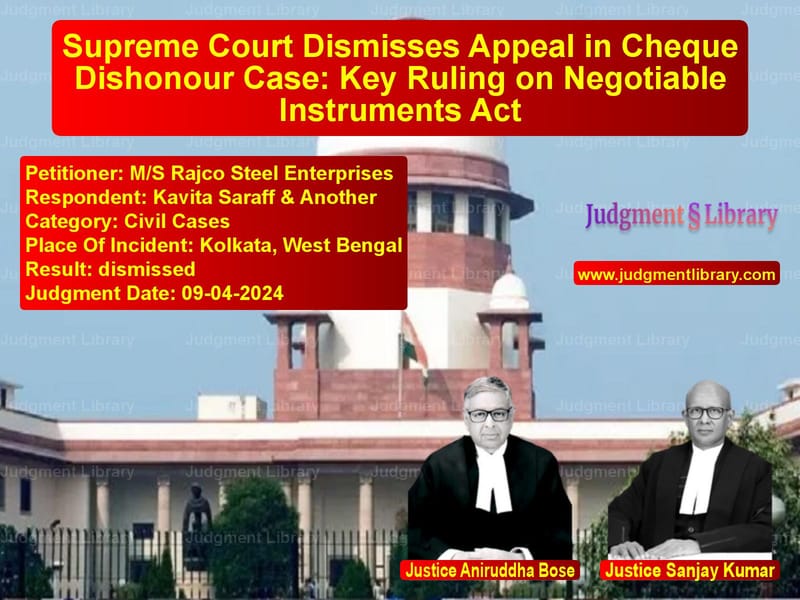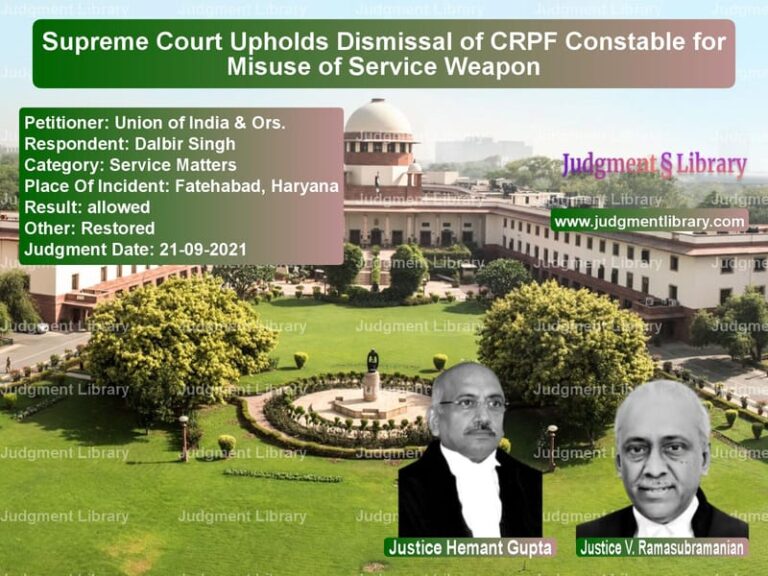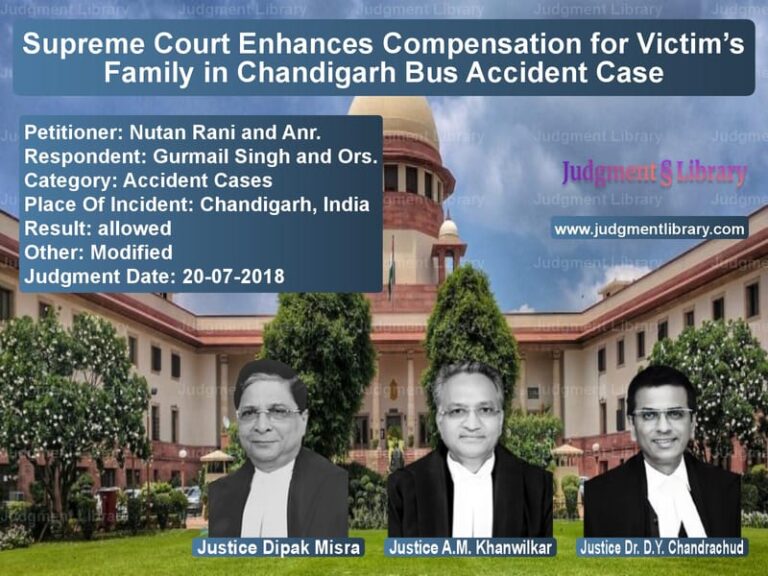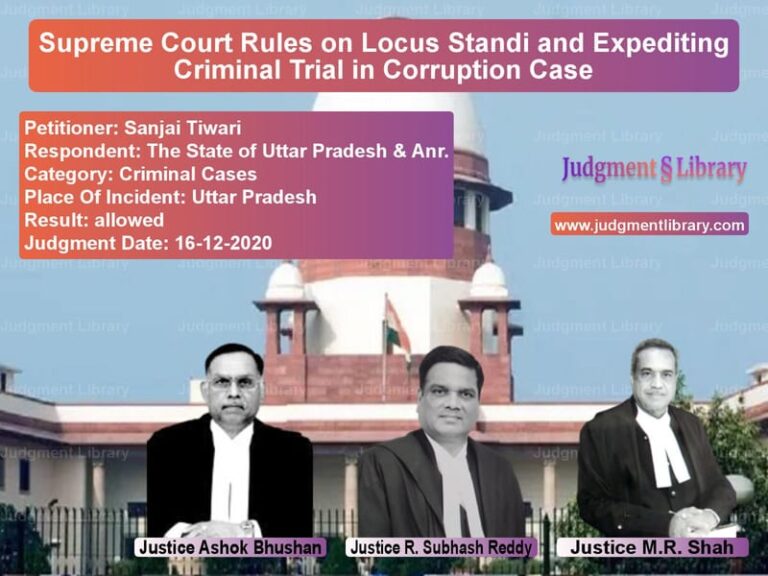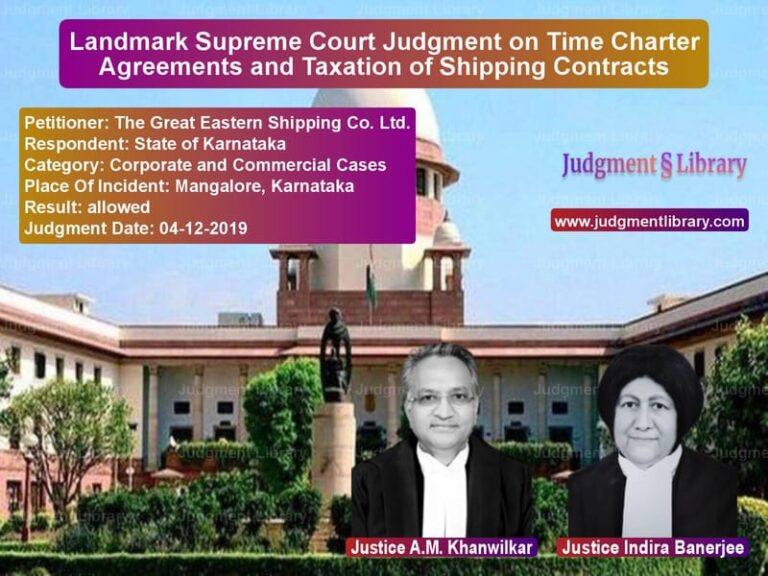Supreme Court Dismisses Appeal in Cheque Dishonour Case: Key Ruling on Negotiable Instruments Act
The Supreme Court of India recently dismissed an appeal in the case of M/S Rajco Steel Enterprises v. Kavita Saraff & Another, upholding the acquittal of the accused in a cheque dishonour case. The judgment, delivered on April 9, 2024, provides significant legal clarity on the application of Section 138 of the Negotiable Instruments Act, 1881 (NI Act), which deals with cheque dishonour due to insufficiency of funds.
Background of the Case
The petitioner, M/S Rajco Steel Enterprises, a partnership firm dealing in iron and steel products, filed four complaint cases under Section 138 of the NI Act after four cheques issued by the accused, Kavita Saraff, were dishonoured due to insufficient funds. The cheques in question were issued between November 7, 2008, and November 24, 2008, drawn on Axis Bank, Burra Bazar, Kolkata.
The petitioner claimed that these cheques were issued to discharge a financial liability, and upon dishonour, a statutory demand notice was sent on May 4, 2009. Despite receipt of the notice, the accused did not comply with the payment demand.
Trial Court’s Verdict
The case was filed in the Metropolitan Magistrate’s Court, Kolkata, under complaint numbers CC Nos. 34905, 34906, 34907, and 34908 of 2009. The trial court convicted the accused under Section 138 of the NI Act, holding that:
- The cheques were issued in discharge of a legally enforceable debt.
- The accused had failed to rebut the presumption under Sections 118 and 139 of the NI Act, which assume that cheques issued are for legally valid transactions.
Appeal Before the Sessions Court
The accused challenged the conviction before the Sessions Court, arguing that:
- The cheques were given in blank as part of stock market transactions and were misused by the complainant.
- No documentary evidence was produced to substantiate the alleged financial assistance provided by the complainant.
- The complainant had illegally obtained the cheques from the custody of the Central Bureau of Investigation (CBI) during an investigation.
The Sessions Court set aside the conviction and acquitted the accused, citing that the complainant had failed to establish the existence of a legally enforceable debt.
High Court’s Decision
The complainant, dissatisfied with the acquittal, approached the Calcutta High Court. The High Court upheld the acquittal, reasoning that:
- The complainant failed to prove that the cheques were issued for a valid financial transaction.
- The balance sheets of the accused reflected poor financial conditions, making it improbable that she had entered into a transaction of such a high value.
- The burden of proof had shifted back to the complainant, who failed to substantiate his claims with documentary evidence.
Supreme Court’s Observations and Ruling
The complainant further appealed to the Supreme Court under Article 136 of the Constitution, challenging the acquittal. The Supreme Court bench, comprising Justices Aniruddha Bose and Sanjay Kumar, dismissed the appeal, ruling that:
- The High Court and Sessions Court had conducted a thorough analysis of the evidence and found the complainant’s case lacking in proof of financial assistance.
- In cheque dishonour cases, the presumption of guilt under Section 139 of the NI Act is rebuttable, and the accused had successfully raised doubts about the complainant’s claims.
- Once an accused presents a reasonable defense, the complainant must establish the enforceable debt beyond doubt.
“The jurisdiction of this Court under Article 136 of the Constitution to interfere with concurrent findings of fact is not in question, when such findings are based on no evidence or are perverse. However, both appellate courts have examined the evidence threadbare and arrived at a plausible conclusion.” – Justice Aniruddha Bose
Key Legal Precedents Considered
The Supreme Court referred to multiple precedents to support its ruling:
- Basalingappa v. Mudibasappa (2019) 5 SCC 418: Established that once the accused rebuts the presumption under Section 139, the burden shifts back to the complainant.
- K. Subramani v. K. Damodara Naidu (2015) 1 SCC 99: Held that a mere claim of financial assistance is insufficient unless substantiated by documentary proof.
- Krishna Janardhan Bhat v. Dattatraya G. Hegde (2008) 4 SCC 54: Stressed that the burden of proof is on the complainant to establish the existence of a legally enforceable debt.
Implications of the Judgment
The Supreme Court’s verdict has several important implications for cheque dishonour cases:
- Burden of Proof in NI Act Cases: While the presumption under Section 139 favors the complainant, it is not absolute and can be rebutted by the accused.
- Significance of Documentary Evidence: Mere verbal claims of financial transactions are insufficient to establish liability under Section 138.
- Stock Market Transactions and Cheque Dishonour: Courts may consider the nature of financial dealings, especially where cheques are issued in the course of speculative trading.
- Judicial Review Under Article 136: The Supreme Court reaffirmed that it does not interfere in factual findings unless there is a clear perversity in the judgment.
Conclusion
The Supreme Court’s decision in M/S Rajco Steel Enterprises v. Kavita Saraff & Another reinforces the legal principle that complainants in cheque dishonour cases must prove the existence of a legally enforceable debt. It also clarifies that the presumption under the NI Act does not automatically guarantee conviction and that courts must critically examine the factual background before arriving at a conclusion.
Petitioner Name: M/S Rajco Steel Enterprises.Respondent Name: Kavita Saraff & Another.Judgment By: Justice Aniruddha Bose, Justice Sanjay Kumar.Place Of Incident: Kolkata, West Bengal.Judgment Date: 09-04-2024.
Don’t miss out on the full details! Download the complete judgment in PDF format below and gain valuable insights instantly!
Download Judgment: ms-rajco-steel-ente-vs-kavita-saraff-&-anot-supreme-court-of-india-judgment-dated-09-04-2024.pdf
Directly Download Judgment: Directly download this Judgment
See all petitions in Cheque Dishonour Cases
See all petitions in Debt Recovery
See all petitions in Contract Disputes
See all petitions in Judgment by Aniruddha Bose
See all petitions in Judgment by Sanjay Kumar
See all petitions in dismissed
See all petitions in supreme court of India judgments April 2024
See all petitions in 2024 judgments
See all posts in Civil Cases Category
See all allowed petitions in Civil Cases Category
See all Dismissed petitions in Civil Cases Category
See all partially allowed petitions in Civil Cases Category

